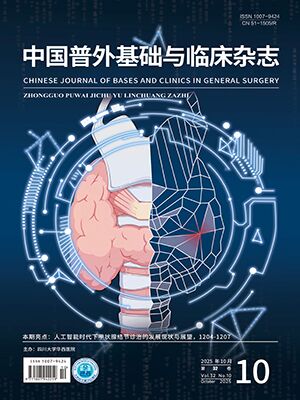Objective To evaluate the diagnostic efficiency of serum soluble CD26 (sCD26) on the diagnosis of colorectal cancer.
Methods The serum sCD26 concentration of 59 colorectal cancer patients, 51 colorectal benign disease patients, and 41 healthy volunteers were detected by ELISA. The diagnostic efficiency of sCD26 and carcinoma embryonic antigen (CEA) was assessed by receiver operating characteristics (ROC) analysis. The association between sCD26 and colorectal cancer was assessed by logistic regression which included CEA in the model.
Results Increased serum sCD26 was observed in colorectal cancer patients (P<0.01), but the differences of sCD26 in different Dukes stages were not statistic significance (P=0.78). The area under cure (AUC) of sCD26 confirmed by ROC analysis was 0.72 〔95% confidence interval (CI):0.63-0.82, P<0.01〕. The diagnostic sensitivity and specificity for sCD26 at 526 μg/L, the optimal diagnostic threshold, were 0.59 (95% CI: 0.48-0.72) and 0.80 (95% CI: 0.67-0.90), respectively. Positive serum sCD26 was associated with colorectal cancer after adjusted for CEA with odds ration (OR) 5.17 (95% CI:1.72-15.53, P<0.01), as confirmed by logistic regression. Increased positive rate of serum sCD26 was observed in patients at Dukes A stage (P=0.03), but not Dukes B, C, and D stage (P<0.05).
Conclusions Serum sCD26 has high diagnostic performance for colorectal cancer. The association of sCD26 is independent of serum CEA. Compared to serum CEA, sCD26 has more potential to be an early biomarker for colorectal cancer diagnosis.
Citation: WANG Xiaogang,WANG Chenghong,TONG Zhong. Increased Serum Soluble CD26 in Colorectal Cancer Patients and Its Clinical Significance. CHINESE JOURNAL OF BASES AND CLINICS IN GENERAL SURGERY, 2012, 19(6): 642-645. doi: Copy
Copyright © the editorial department of CHINESE JOURNAL OF BASES AND CLINICS IN GENERAL SURGERY of West China Medical Publisher. All rights reserved




